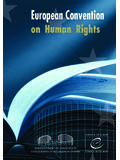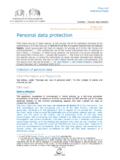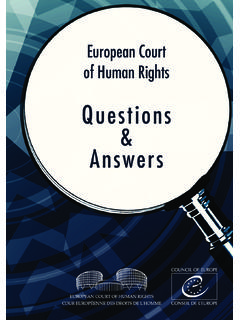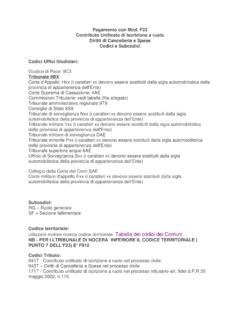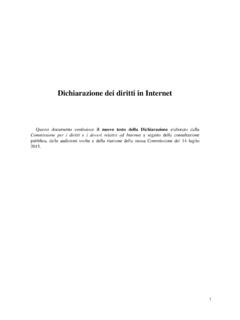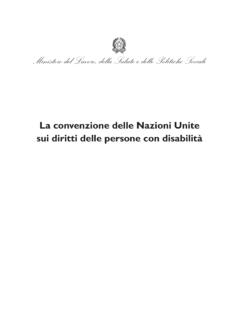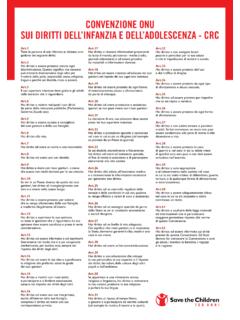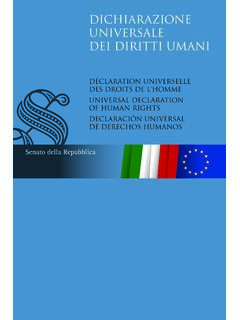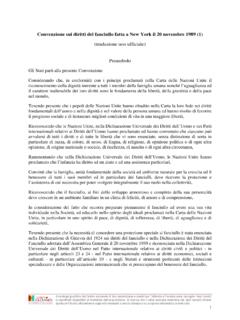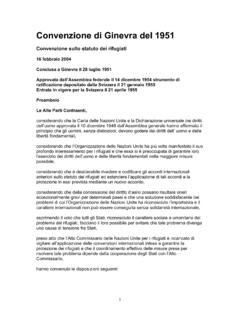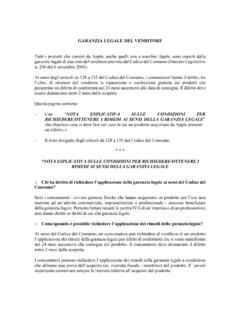Transcription of Guide on the case-law - Prisoners’ rights
1 Guide on the case-law of the European Convention on Human rights Prisoners rights Updated on 31 December 2021 Prepared by the Registry. It does not bind the Court. Guide on case-law of the Convention Prisoners' rights European Court of Human rights 2/95 Last update: Publishers or organisations wishing to translate and/or reproduce all or part of this Guide in the form of a printed or electronic publication are invited to contact for information on the authorisation procedure. If you wish to know which translations of the case-law Guides are currently under way, please see Pending translations. This Guide was originally drafted in English. It is updated regularly and, most recently, on 31 December 2021. It may be subject to editorial revision. The case-law Guides are available for downloading at ( case-law case-law analysis case-law guides).
2 For publication updates please follow the Court s Twitter account at Council of Europe/European Court of Human rights , 2022 Guide on case-law of the Convention Prisoners' rights European Court of Human rights 3/95 Last update: Table of contents Table of 3 Note to readers .. 5 Introduction .. 6 I. General principles .. 7 II. Conditions of imprisonment .. 9 A. Admission and record-keeping .. 10 B. 11 C. Accommodation .. 12 D. Hygiene .. 14 E. Clothing and bedding .. 15 F. Nutrition .. 16 G. Exercise and recreation .. 17 H. Searches and control .. 18 I. Transport of prisoners .. 19 III. Contact with the outside world .. 21 A. Family contacts and visits .. 21 B. Right to marry .. 25 C. Protection of different means of communication .. 26 IV. Health care in prison .. 28 A. General principles .. 28 B. Physical illnesses, disabilities and old age.
3 30 C. Infectious diseases .. 33 D. Mental health care .. 36 E. Drug addiction .. 38 F. Other health-related issues .. 39 1. Passive smoking .. 39 2. Hunger strike .. 40 V. Good order in prison .. 42 A. Use of force .. 42 B. Use of instruments of restraint .. 44 C. Disciplinary measures and punishment .. 45 D. Inter-prisoner violence .. 46 VI. Special high security and safety measures .. 48 A. Special prison regimes .. 48 Guide on case-law of the Convention Prisoners' rights European Court of Human rights 4/95 Last update: B. Solitary confinement .. 50 VII. Special categories of detainees .. 52 A. Women with infants and minors .. 53 B. Foreign nationals and minorities .. 56 C. Life prisoners .. 57 D. Detainees in the context of armed conflict .. 60 VIII. Prisoners rights in judicial proceedings .. 61 A. Access to legal advice.
4 61 B. Effective participation in domestic judicial proceedings .. 62 C. Communication with the Court .. 63 IX. Freedom of thought, conscience and religion .. 64 X. Freedom of expression .. 66 XI. Prison work .. 68 XII. Prisoners property .. 70 XIII. Education .. 71 XIV. Right to vote .. 72 XV. Prohibition of discrimination .. 74 XVI. Right to an effective remedy .. 78 XVII. Prisoners rights in extra-territorial context .. 80 A. General principles .. 81 B. Specific risks in the extra-territorial context .. 81 List of cited cases .. 85 Guide on case-law of the Convention Prisoners' rights European Court of Human rights 5/95 Last update: Note to readers This Guide is part of the series of case-law Guides published by the European Court of Human rights (hereafter the Court , the European Court or the Strasbourg Court ) to inform legal practitioners about the fundamental judgments and decisions delivered by the Court.
5 This particular Guide analyses and sums up the case-law under different Articles of the European Convention on Human rights (hereafter the Convention or the European Convention ) relating to prisoners rights . It should be read in conjunction with the case-law guides by Article, to which it refers systematically. The case-law cited has been selected among the leading, major, and/or recent judgments and decisions. The Court s judgments and decisions serve not only to decide those cases brought before the Court but, more generally, to elucidate, safeguard and develop the rules instituted by the Convention, thereby contributing to the observance by the States of the engagements undertaken by them as Contracting Parties (Ireland v. the United Kingdom, 18 January 1978, 154, Series A no. 25, and, more recently, Jeronovi s v.)
6 Latvia [GC], no. 44898/10, 109, 5 July 2016). The mission of the system set up by the Convention is thus to determine, in the general interest, issues of public policy, thereby raising the standards of protection of human rights and extending human rights jurisprudence throughout the community of the Convention States (Konstantin Markin v. Russia [GC], 30078/06, 89, ECHR 2012). Indeed, the Court has emphasised the Convention s role as a constitutional instrument of European public order in the field of human rights (Bosphorus Hava Yollar Turizm ve Ticaret Anonim irketi v. Ireland [GC], no. 45036/98, 156, ECHR 2005-VI, and, more recently, and v. Spain [GC], nos. 8675/15 and 8697/15, 110, 13 February 2020).. The case-law cited may be in either or both of the official languages (English or French) of the Court and the European Commission of Human rights .
7 Unless otherwise indicated, all references are to a judgment on the merits delivered by a Chamber of the Court. The abbreviation (dec.) indicates that the citation is of a decision of the Court and [GC] that the case was heard by the Grand Chamber. Chamber judgments that were not final when this update was published are marked with an asterisk (*). Guide on case-law of the Convention Prisoners' rights European Court of Human rights 6/95 Last update: Introduction 1. The Court is frequently called upon to rule on complaints alleging a violation of different Articles of the Convention related to the treatment of prisoners as well as restrictions on or interferences with their rights . The Court has developed abundant case-law determining the nature and scope of prisoners rights under the Convention and the duties of the domestic authorities as regards the treatment of prisoners.
8 2. The present Guide provides an overview of the Court s case-law related to prisoners rights . Its structure reflects different phases of imprisonment and elaborates on different aspects of life in prison. The Guide contains a transversal analysis of the Court s case-law , taking into account all relevant provisions of the Convention related to prisoners rights . 3. For the purpose of this Guide the term prisoners primarily covers persons who have been remanded in custody by a judicial authority or who have been deprived of their liberty following conviction but may also refer to all other persons detained for any other reason in a prison. Moreover, it should be noted that the principles related to prisoners rights may apply to people held in waiting rooms or similar spaces intended to be used for short periods of time, such as police stations and immigration detention facilities (Mur i v.)
9 Croatia [GC], 2016, 92; see, for instance, Georgia v. Russia (I) [GC], 2014, 192-205; Khlaifia and Others v. Italy [GC], 2016, 163-167; Sakir v. Greece, 2016, 50-53). These principles may also apply to people held in psychiatric establishments (Solcan v. Romania, 2019, 24-29). Guide on case-law of the Convention Prisoners' rights European Court of Human rights 7/95 Last update: I. General principles Article 3 of the Convention No one shall be subjected to torture or to inhuman or degrading treatment or punishment. Article 5 of the Convention 1. Everyone has the right to liberty and security of person. No one shall be deprived of his liberty save in the following cases and in accordance with a procedure prescribed by law: (a) the lawful detention of a person after conviction by a competent court; (b) the lawful arrest or detention of a person for non- compliance with the lawful order of a court or in order to secure the fulfilment of any obligation prescribed by law; (c) the lawful arrest or detention of a person effected for the purpose of bringing him before the competent legal authority on reasonable suspicion of having committed an offence or when it is reasonably considered necessary to prevent his committing an offence or fleeing after having done so.
10 (d) the detention of a minor by lawful order for the purpose of educational supervision or his lawful detention for the purpose of bringing him before the competent legal authority; (e) the lawful detention of persons for the prevention of the spreading of infectious diseases, of persons of unsound mind, alcoholics or drug addicts or vagrants; (f) the lawful arrest or detention of a person to prevent his effecting an unauthorised entry into the country or of a person against whom action is being taken with a view to deportation or extradition.. Article 8 of the Convention 1. Everyone has the right to respect for his private and family life, his home and his correspondence. 2. There shall be no interference by a public authority with the exercise of this right except such as is in accordance with the law and is necessary in a democratic society in the interests of national security, public safety or the economic well-being of the country, for the prevention of disorder or crime, for the protection of health or morals, or for the protection of the rights and freedoms of others.

